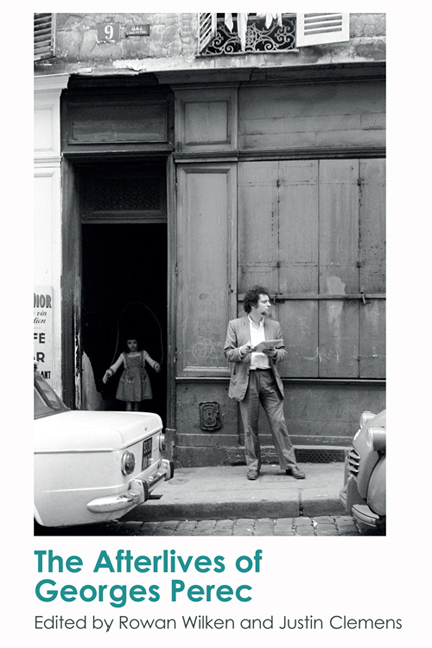Book contents
- Frontmatter
- Contents
- List of Figures
- Acknowledgements
- Notes on Contributors
- 1 Posthumous News: The Afterlives of Georges Perec
- PART I Art of the (Un)realisable
- PART II The Poetics of the Quotidian and Urban Space
- PART III Ludic Intensities and Creative Constraints
- PART IV Productive Problems of Description and Transcription
- 12 ‘An Attempt at Exhausting an Augmented Place in Paris’: Georges Perec, Observer-Writer of Urban Life, as a Mobile Locative Media User
- 13 The Quick Brown Fox Jumps Over the Lazy Dog: Perec, Description and the Scene of Everyday Computer Use
- Afterword
- Index
12 - ‘An Attempt at Exhausting an Augmented Place in Paris’: Georges Perec, Observer-Writer of Urban Life, as a Mobile Locative Media User
from PART IV - Productive Problems of Description and Transcription
Published online by Cambridge University Press: 07 December 2017
- Frontmatter
- Contents
- List of Figures
- Acknowledgements
- Notes on Contributors
- 1 Posthumous News: The Afterlives of Georges Perec
- PART I Art of the (Un)realisable
- PART II The Poetics of the Quotidian and Urban Space
- PART III Ludic Intensities and Creative Constraints
- PART IV Productive Problems of Description and Transcription
- 12 ‘An Attempt at Exhausting an Augmented Place in Paris’: Georges Perec, Observer-Writer of Urban Life, as a Mobile Locative Media User
- 13 The Quick Brown Fox Jumps Over the Lazy Dog: Perec, Description and the Scene of Everyday Computer Use
- Afterword
- Index
Summary
So now, at a time when others are asleep, Mr G. is bending over a table, darting on to a sheet the same glance that a moment ago he was directing towards external things … And the external world is reborn upon his paper.
INTRODUCTION
The modern metropolis has been aptly described as a place of, and a place for, strangers, where strangers are expected to be ‘thrown together’. Charles Baudelaire's flaneur heralded the rise to dominance of the modern metropolis in the Western world. The way he used his leisurely gait functioned as a political sign of resistance against capitalistic and consumer concerns in the metropolis. On an experiential plane, the flaneur could immerse himself in the joys of being thrown together with anonymous strangers, of being an anonymous body lost in the crowd – that is, in the random flow of a multitude of other strangers:
The crowd is his element, as the air is that of birds and water of fishes. His passion and his profession are to become one flesh with the crowd. For the perfect flaneur, for the passionate spectator, it is an immense joy to set up house in the heart of the multitude, amid the ebb and flow of movement, in the midst of the fugitive and the infinite. To be away from home and yet to feel oneself everywhere at home; to see the world, to be at the center of the world, and yet to remain hidden from the world – impartial natures which the tongue can but clumsily define. The spectator is a prince who everywhere rejoices in his incognito.
His delight was primarily visual, and his experience framed as an unpredictable succession of sights, which could be presented as lists of events intelligible to all, that is to any other stranger in the crowd. The flaneur's conduct and the way it could be described systematically conjured up ‘the “seen” and “witnessed” character of space and particularly urban space’:
He delights in fine carriage and proud horses, the dazzling smartness of the grooms, the expertness of the footmen, the sinuous gait of the women, the beauty of the children, happy to be alive and nicely dressed – in a word, he delights in universal life.
- Type
- Chapter
- Information
- The Afterlives of Georges Perec , pp. 205 - 225Publisher: Edinburgh University PressPrint publication year: 2017



